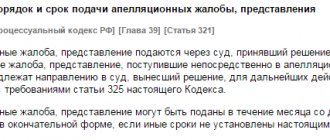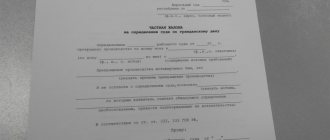Procedure for filing a waiver of appeal
The procedure for refusing appeals in the Russian Federation is determined by the provisions of the procedural code - a fundamental legal document.
A party may initiate termination of the proceedings without explaining the reason for the decision.
However, in the case of a refusal, the court of appeal verifies the following facts:
- availability of appropriate powers of the applicant;
- voluntary and conscious nature of the plaintiff’s appeal.
Compliance with these requirements is mandatory for the relevant decision to enter into force.
After receiving the refusal of the claim, the court issues a ruling on its acceptance. This resolution further determines the termination of proceedings on the complaint.
As a result, the court decision adopted in the first instance comes into force. The relevant information, in accordance with Federal Law No. 262, is posted on the official website of the court.
Refusal of a complaint to the arbitration court
In arbitration proceedings, the regulations for the procedure for refusing a repeated claim in court are enshrined in Chapter 34 of the Arbitration Procedure Code of the Russian Federation.
The arbitration court of appeal stops the proceedings on the appeal if the applicant has received a request to refuse its further consideration and the refusal has been accepted by the court.
The main provisions set out in Articles 49 and 265 of this Code define the following:
- it is necessary to renounce previously stated disagreement with a judicial act before taking legal action;
- acceptance of the petition is permissible in the absence of contradictions to the current legislation, does not affect the rights and freedoms of citizens;
- the appeal is made to the authority where the appeal was originally filed;
- the plaintiff’s repeated appeal after refusal with a similar request is impossible;
- It is possible to further appeal the determination to terminate the process.
The arbitration court may independently reject the request to cancel the decision in accordance with the provisions specified in Article 264 of the Arbitration Procedure Code of the Russian Federation.
Filing a refusal to a court of general jurisdiction in a civil case
To withdraw an appeal within the framework of legal proceedings in a civil case, the applicant needs to familiarize himself with the provisions of Chapter 39 of the Code of Civil Procedure of the Russian Federation.
Similarly, Article 326 of the legal act stipulates that filing a review is permissible only before the court makes a written ruling. Upon review, a claim is accepted confirming the closure of the civil case.
Article 326.1 also establishes that the desire to terminate legal proceedings can be expressed by the plaintiff directly at the hearing.
The corresponding statement is entered into the protocol and signed by the applicant. Likewise, the case may be dismissed upon admission of the claim or conclusion of a settlement agreement.
Refusal of a complaint in a criminal case
Unlike civil and administrative proceedings, participants in criminal proceedings can withdraw a complaint in a criminal case only before the start of the appellate court hearing.
READ Appeal against a court verdict in a criminal case - how to draw up and where to file
These conditions are enshrined in paragraph 3 of Article 389.8 of Chapter 45.1 of the Code of Criminal Procedure of the Russian Federation. Otherwise, the procedure for filing an application remains the same.
When the consideration of the case moves to the stage of judicial investigation, the refusal of the complaint in the criminal case is not accepted and is not satisfied.
Article 322 of the Code of Civil Procedure of the Russian Federation. Contents of appeals, submissions (current version)
Example: The Supreme Court of the Republic of Ingushetia, in its Appeal ruling dated November 10, 2021 No. 33-899/2016, confirmed the legality and validity of the ruling of the trial court to leave the complaint without progress, due to the fact that the name of the court that made the appealed decision was incorrectly indicated. At the court hearing, the appellant's representative agreed that the specified defect occurred, but believed that it was insignificant and the determination was illegal. However, the judicial panel found that, by leaving the complaint of the defendant’s representative without progress, the court of first instance acted within the framework of the requirements of procedural legislation, pointing out the existing shortcomings in the procedural document and the need to eliminate them, and the defendant was not deprived of the opportunity to eliminate them.
However, one indication of a court decision in an appeal or presentation is not enough to accept such a complaint or presentation for consideration. The appellant must:
- firstly, to justify on what grounds he considers the decision of the court of first instance incorrect (illegal and (or) unfounded) (see, for example, the Appeal ruling of the Saratov Regional Court dated November 30, 2021 in case No. 33-9155/2016 , which recognized the decision of the court of first instance to leave the appeal without progress as legal and justified).
In addition, as stated in paragraph 11 of the Resolution of the Plenum of the Supreme Court of the Russian Federation dated June 19, 2012 No. 13, an appeal filed by a person not involved in the case must contain a justification for the violation of his rights and (or) the imposition of responsibilities on him the appealed court decision. In this regard, the courts of first instance should check whether such justification is contained in the appeal filed by a person not involved in the case. In the absence of such justification, the court of first instance leaves the appeal without movement, setting a reasonable period for correcting the specified deficiency;
- secondly, state your requirements regarding this decision (cancel or change the decision of the court of first instance in whole or in part and make a new decision on the case, cancel the decision of the court of first instance in whole or in part and terminate the proceedings in the case or leave the application without consideration in full or in part) in accordance with the powers of the appellate court (see the commentary to Article 328 for more details).
It should be noted that the requirements for the content of the appeal and submissions under consideration were considered by the Constitutional Court of the Russian Federation for compliance with the provisions of the Constitution of the Russian Federation as containing uncertainty in the requirements for the form and content of the appeal, allowing the court of first instance not to transfer a private complaint to the court of appeal on the grounds of absence it contains requirements related to the powers of the appellate court, and the grounds on which the applicant does not agree with the ruling of the trial court. However, the Constitutional Court of the Russian Federation, considering the complaint, indicated that the norm in question does not imply its arbitrary application and obliges the judge, upon identifying that the appeal was filed with the court by an interested person in violation of the requirements established by law, to leave the appeal without movement and explain to such person the shortcomings of the presented document, giving him a reasonable time to correct them.
———————————
See: Determination of the Constitutional Court of the Russian Federation of October 27, 2015 N 2510-O “On the refusal to accept for consideration the complaint of citizen Tlepsh Menlievich Shogenov about the violation of his constitutional rights by parts one and two of Article 131, part one of Article 322, part three of Article 325 and Article 333 of the Civil Procedure Code of the Russian Federation.”
Guided by the position of the Plenum of the Supreme Court of the Russian Federation, the courts must take into account that in the absence of an appeal or presentation in violation of the provisions of the commented paragraph of reference to the grounds on which the person filing the complaint or the prosecutor making the presentation considers the appealed court decision subject to cancellation or amendment, as well as for demands that comply with the powers of the appellate court, the judge must make a ruling to leave the appeal or presentation without progress and set a reasonable period for correcting these shortcomings (clause 13 of the Resolution of the Plenum of the Supreme Court of the Russian Federation of June 19, 2012 No. 13) .
Taking into account the fact that in the Federal Law of December 9, 2010 N 353-FZ “On Amendments to the Civil Procedure Code of the Russian Federation”, the legislator set out the commented paragraph in a new edition, combining in it the requirements for the content of the appeal in terms of the appellant’s requirements and grounds for such requirements, it was logically correct to exclude clause 5 of the commented part, which provides for the need to include “the demands of the interested party” in the content of the appeal. The specified paragraph was excluded by the above-mentioned Federal Law from January 1, 2012.
4. In order to justify the appellant’s position regarding the appealed court decision, the legislator, in paragraph 6 of part 1 of the commented article, provided for the need to indicate in the appeal, to present a list of documents attached to it (to it), to which the appellant refers. As a general rule, all written evidence must be attached to the appeal or presentation with copies according to the number of persons participating in the case. However, in judicial practice there has not been a single position on the issue of further movement of the appeal in the absence of the attached documents themselves.
On the one hand, based on the provision under consideration, as well as part 5 of the commented article, the attachment of the documents listed in the list in the appeal, and their copies according to the number of persons participating in the case, is mandatory.
Example: The Supreme Court of the Republic of Mordovia, by its Resolution dated July 31, 2014 in case No. 33-1498/2014, recognized the judge’s decision to leave the appeal without progress as legal, since the filed appeal contains an indication of the presence of an appendix to it of 18 names of documents . However, this appendix to the appeal is missing from the case materials, as are copies of the appendix corresponding to the number of persons participating in the case.
On the other hand, in judicial practice, the absence of attached documents listed in the appeal or presentation, taking into account the specific circumstances of the case, can be considered as a shortcoming that does not prevent the consideration of the appeal on the merits.
Example: in the appeal the applicant listed a list of documents attached to the complaint, incl. a video recording on an electronic medium about recording an accident - for the court of second instance, since the participants in the case are familiar with the video recording when viewing it at the court hearing. However, employees of the district court drew up an act on the absence of documents or other attachments, according to which the video recording indicated in the list of documents attached to the complaint was missing, which served as the basis for leaving the appeal without movement, and subsequently for returning the appeal to the applicant. In a private complaint against the judge’s ruling to return the appeal, the applicant indicated that since a video recording on an electronic medium (flash card) about recording the accident was attached to the court of second instance, he intended to present a flash card with the video recording, as well as equipment for viewing it directly court of appeal. The Presidium of the Volgograd Regional Court considered that the indicated arguments of the applicant were left without due attention by the court of appeal, while the shortcomings made by the applicant do not prevent the consideration of the appeal on the merits, and by its Resolution of August 6, 2014 No. 44g-93/2014 canceled the appeal the ruling of the lower court, and the issue of accepting the appeal was sent for a new consideration to the court of first instance.
As follows from the foregoing, it seems that the courts, when deciding whether an appeal or presentation meets the requirements of the commented norm, must proceed from the specific circumstances reflected in the complaint or presentation, focusing on the constitutionally guaranteed right of everyone to judicial protection and appeal of judicial acts.
At the same time, appellants, when filing appeals and presentations, should keep in mind that the document they submit must meet not only the requirements of the commented article, but also the generally recognized principles and norms of international law and international treaties of the Russian Federation, which contain a certain list of requirements for form and content appeals to the court (complaints) that do not allow expressions indicating disrespect for the state, the court, or insulting the honor and dignity of citizens, which corresponds to the generally recognized principle of international law - the principle of admissibility. The conditions of admissibility are established by the International Covenant on Civil and Political Rights (New York, 16 December 1966) and its Optional Protocol, as well as the Convention for the Protection of Human Rights and Fundamental Freedoms (Rome, 4 November 1950). The use of offensive language by the applicant in a complaint addressed to the court is an abuse of the right to file it.
Example: the Judgment of the European Court of Human Rights in the case of Chernitsyn v. Russia of April 6, 2006 sets out the position on the issue of admissibility of complaints addressed to the court, according to which the consistent use by the applicant of offensive or provocative expressions can be considered an abuse of the right to treatment complaint.
Taking into account the norms of international law, courts in the Russian Federation also refuse to accept appeals containing offensive language.
Example: The Supreme Court of the Udmurt Republic, by its Appeal ruling dated February 25, 2015 in case No. 33-653, recognized the legality of the court of first instance leaving the appeal without progress, since the appeal filed by K. does not meet the requirements of the current civil procedural legislation, which does not allow the existence of in appeals, as well as other documents addressed to the court, any offensive expressions addressed to justice or specific judges.
5. The provisions of Part 2 of the commented article, although they establish requirements for the content of appeals, submissions, in fact, are the basic norm that determines, together with the provisions of Art. 327.1 of the Code of Civil Procedure of the Russian Federation (see commentary to this article) the limits of appellate review of court decisions that have not entered into legal force. An important condition for reviewing a case by an appellate court is a ban on accepting new claims that were not the subject of consideration in the court of first instance. This limitation means that the legislator establishes the limits of consideration of the case in the appellate court for the parties and other persons participating in the case, since the subject of proof in the case of the appellate court cannot be different from the subject of proof in the case of the first instance court. The norm in question serves as a guarantee of sequential consideration of the case in two courts and prevents unscrupulous participants in the trial from filing claims directly in the court of second instance, since the essence of the institution of appeal lies precisely in the secondary consideration and resolution of the case on the merits. The prohibition on the statement of new claims in the court of appeal is closely related to the inadmissibility of reference in the appeal or presentation to new evidence that was not presented to the court of first instance.
———————————
See: Borisova E.A. Appeal in civil (arbitration) proceedings. M., 2000. P. 133.
An exception to this rule is the right of the appellate court, if there are good reasons, to accept additional evidence that was not presented to the court of first instance due to the impossibility of presenting it for reasons beyond the control of the person participating in the case. In this case, the impossibility of submitting evidence to the court of first instance means, in particular, a violation of the law in the examination of evidence on the part of the court of first instance.
———————————
See: Danilov E.P. Lawyer's Directory: Consultations. Defense in court. Sample documents. M., 1998. S. 354 - 355.
In pursuance of the provisions of the commented part, in accordance with paragraph 12 of the Resolution of the Plenum of the Supreme Court of the Russian Federation of June 19, 2012 No. 13, the court of first instance should check the presence in the appeal, presentation, containing a reference to additional (new) evidence, the applicant’s justification for the impossibility of presenting it to the court of first instance for reasons beyond the control of the person filing the appeal and the prosecutor bringing the appeal. However, it is necessary to take into account that the court of first instance does not have the right to assess the nature of the reasons (good or bad) for the impossibility of submitting additional (new) evidence to the court of first instance, since the issue of accepting and examining additional (new) evidence is decided by the court of appeal.
In addition, an important point in the exercise of the right to appeal of persons who were not involved in the case, but the issue of the rights and obligations of which was resolved by the court of first instance, is the right of these persons to refer in the appeal to any additional (new) evidence that were not the subject of research and assessment in the court of first instance, since such persons were deprived of the opportunity to exercise their procedural rights and obligations when considering the case in the court of first instance (paragraph 3, paragraph 12 of the Resolution of the Plenum of the Supreme Court of the Russian Federation dated June 19, 2012 No. 13).
6. A mandatory requisite for an appeal or presentation, as follows from the provisions of Part 3 of the commented article, is the personal signature of the person filing the appeal or presentation, which confirms the appellant’s own will, and also allows the court to determine whether the person who signed the appeal is competent, submission for the filing of such a procedural document. Taking into account the fact that the right to appeal can be exercised both personally and through a representative, an important condition for filing an appeal is to attach to it a power of attorney for the representative with a mandatory indication in the power of attorney of the right to sign and file an appeal on behalf of the person participating in the case. If the representation is based on the law (for example, the representatives are the parents of a minor child, the legal representatives of an incapacitated person, the head of a legal entity, etc.), the relevant documents confirming the possibility of legal representation (child’s birth certificate) must be attached to the appeal , a resolution of the guardianship and trusteeship authority on the establishment of guardianship over a legally incompetent person, an order on the appointment or hiring of the head of a legal entity, etc.).
An exception to the requirement under consideration regarding the attachment to the appeal of a power of attorney or other document confirming the authority of the representative is the presence of such documents in the case.
Failure to comply with the requirements set out in the commented norm is grounds for leaving the appeal or presentation without progress.
Example: The Volgograd Regional Court agreed with the opinion of the city court, which left K.V.A.’s appeal without progress, since an appeal was filed in the reception room of the city court by R.V.M., who introduced himself as a representative of K.V.A., with In this case, the power of attorney was not presented due to the fact that a copy is available in the case materials. However, it did not follow from the text of the power of attorney that R.V.M. as a representative of K.V.A. can sign and file an appeal (see Appeal ruling of the Volgograd Regional Court dated October 19, 2021 in case No. 33-14175/2016).
The legislator in paragraph 2 of the commented part places special emphasis on the signing of the appeal presentation by the prosecutor, since such a presentation is signed not by any official of the prosecutor’s office, but by a specially authorized one in accordance with the norms of the Federal Law of January 17, 1992 N 2202-1 “On the Prosecutor’s Office of the Russian Federation” an employee of the prosecutor's office who took part in the consideration of the case by the court of first instance.
Example: The Stavropol Regional Court removed from appeal consideration the appeal presentation of the senior assistant prosecutor L., noting that the court of first instance, when accepting the appeal presentation, did not check the authority of the senior assistant prosecutor L. to sign and submit this appeal presentation to the court, since the case materials did not it is seen that the senior assistant prosecutor L. participated in its consideration and she has the authority to sign and submit an appeal to the court (see Appeal ruling of the Stavropol Regional Court dated October 7, 2014 No. 33-5711/2014).
7. The exercise of the right to appeal involves imposing on the appellant the obligation to pay certain court costs, where an important place is occupied by the state fee, the payment or non-payment of which determines the further progress of the appeal proceedings. The provisions of Part 4 of the commented article contain a mandatory rule on the need to attach to the appeal a document confirming the payment of the state fee, provided that such a complaint is subject to payment. The issue of exemption from paying the state fee for filing an appeal depends on the provision of such benefits when filing claims in court, the list of which is established in paragraphs 1, 2 of Art. 333.36 Tax Code of the Russian Federation.
Example: taking into account the fact that the current legislation exempts plaintiffs from paying state fees when filing claims related to violation of consumer rights, then when filing an appeal, the appellant-plaintiff is exempt from paying state fees (see the Appeal ruling of the Moscow City Court dated November 22, 2021 in case No. 33-45575/2016).
As a general rule, in accordance with the current tax legislation, the amount of the state duty when filing an appeal is 50% of the amount of the state duty payable when filing a claim of a non-property nature, namely: for individuals - 150 rubles, for legal entities - 3,000 rubles (Clause 3, Clause 9, Clause 1, Article 333.19 of the Tax Code of the Russian Federation).
Considering that a special procedure for payment by individual entrepreneurs of the state fee when filing a claim of a non-property nature, and therefore when filing an appeal, has not been established, judicial practice proceeds from the fact that individual entrepreneurs must pay the state fee for filing an appeal in the amount provided for individuals.
Example: as noted in the Ruling of the Supreme Court of the Russian Federation of November 3, 2015 N 46-KG15-19, by virtue of the provisions of tax legislation, the institutions, concepts and terms of civil and other branches of legislation of the Russian Federation used in the Tax Code of the Russian Federation are applied in the meaning in what ways they are used in these areas of legislation. At the same time, for the purposes of the Tax Code of the Russian Federation, individual entrepreneurs are understood as individuals registered in the prescribed manner and carrying out entrepreneurial activities without forming a legal entity, heads of peasant (farm) households. The above norms of tax legislation allowed the Supreme Court of the Russian Federation to come to the conclusion that when filing an appeal to a court of general jurisdiction, the state duty is paid by individual entrepreneurs in the amount established for individuals (see paragraph 7 of the Review of Judicial Practice of the Supreme Court of the Russian Federation No. 1 (2016) , approved by the Presidium of the Supreme Court of the Russian Federation on April 13, 2016).
It should also be borne in mind that if the appeal is filed directly with the appellate court, and the state fee for filing it is not paid or is not paid in full, then, as stated in paragraph 55 of the Resolution of the Plenum of the Supreme Court of the Russian Federation dated June 19, 2012 No. 13, this circumstance cannot serve as a basis for the return of the appeal with the case by the appellate court to the court of first instance, and the issue of collecting the state duty in the amount established by law in this case can be resolved by the appellate court, as indicated in the appeal ruling .
In addition, as judicial practice shows, non-payment of the state fee for filing it cannot be considered as a basis for leaving the appeal without progress if the text of the appeal contains a request for exemption from paying the state fee or the provision of an installment plan for its payment.
Example: The Moscow City Court, by its Appeal ruling dated November 24, 2021 in case No. 33-45487/2016, canceled the ruling of the trial court and returned the appeal to the trial court for consideration of the stated petition in accordance with Art. 333.41 of the Tax Code of the Russian Federation, motivating his position by the fact that the court’s conclusion about the absence of a document confirming the payment of the state duty payable when filing an appeal is premature, and therefore the court of first instance had no legal grounds for leaving the defendants’ appeal without progress .
8. The provisions of Part 5 of the commented article serve as a guarantee of the implementation of the principle of procedural equality of the parties, since they provide equal opportunities for persons participating in the case to protect their rights and interests in the field of administration of justice, including in the field of appeal proceedings. Thus, the obligation of the appellant established in the commented norm to provide copies of the appeal, presentation and documents attached to them to all persons participating in the case guarantees the right of the other party, third parties, other persons involved in the case to become familiar with the requirements of the appeal, submissions and documents on which these claims are based, so that they can build their position on the case. In this regard, failure to fulfill this obligation by the appellant is the basis for the court of first instance to issue a ruling to leave the appeal or presentation without progress (see the commentary to Article 323 for more details).
In this case, an important point in fulfilling the duty in question is the number of persons participating in the case, since copies must be attached for each person participating in the case, and not just for the party.
Example: L., filing an appeal against the decision of the court of first instance, attached to it a copy of the appealed judicial act and two copies of the appeal for the persons participating in the case. However, from the case materials it followed that the number of persons participating in the case was four parties, the fact of whose participation in the case was confirmed by the minutes of the court session, and L. was present at this court session. Under such circumstances, the Volgograd Regional Court concluded that two copies of the appeal attached by L. to the appeal were not enough, because their number does not correspond to the number of persons participating in the case, which served as the basis for leaving the appeal without progress (see the Appeal ruling of the Volgograd Regional Court dated October 5, 2021 in case No. 33-13579/2016).
How to write a waiver of appeal
To ensure that the court does not refuse the applicant to stop a civil, arbitration or criminal case based on a previously filed petition to correct or cancel a decision, it is important to comply with the basic requirements for completing the application.
The document should include five blocks:
- Header – located in the upper right corner. Alternately, the name of the authority, full name, residential address and contact number of the applicant are indicated on a new line.
- The main part is in the center of the paper sheet. Initially, the phrase “Application for refusal of the appeal” is written. The new paragraph lists the details and key conditions of the act under which the applicant intends to withdraw the complaint.
- Regulatory justification is in the center under the main part. A link is provided to the article of the regulatory document, according to which the plaintiff or defendant has the right to withdraw from a previously filed complaint.
- Application. A list of documents attached to the application, including a copy of the appeal and an identity card.
- The final part is at the bottom of the page. The date of submission of the document, signature, surname and initials of the applicant are indicated.
How to file an appeal
The time frame for appealing a court decision depends on the category of cases:
| Type of production | Filing deadline (calculated from the date of the decision) |
| Criminal | 10 days |
| Arbitration | Month |
| Civil | Month |
An appeal must be submitted exclusively in writing.
The law defines the circumstances under which it is possible to initiate appeal proceedings:
- The court did not take into account (or incorrectly took into account) certain circumstances in the case.
- The facts taken into account when making the decision are not true.
- There is a violation of legal norms.
- The conclusions made by the judge do not correspond to the materials of the case.
Both the parties to the legal process and all other participants (including third parties) can declare a violation of legal rights. It is important to respect the time frame. Participants in the process have the right to file a complaint until 24 am on the last day of the established period. In this case, evidence of compliance with procedural norms will be a postmark on the envelope or a court stamp with the date of acceptance of the document and its incoming number.
It should be remembered that not all procedural documents can be appealed. For example, a court order is not subject to appeal due to the fact that this act comes into force immediately after its issuance, that is, it can be canceled or changed only by filing a cassation.
The specifics and algorithm for filing a complaint directly depend on the type of litigation. Let's look at each of them in more detail.
In what cases will the complaint not be returned?
According to current legislation, the court has the right to refuse to accept an application to withdraw an appeal.
The basis for such a decision could be:
- forcing the applicant to renounce previously filed claims by third parties;
- signing of a document by an unauthorized person;
- treatment of refusal after the final court decision has been made;
- the statement drawn up does not meet the requirements of the court;
- indication of false information in the application;
- Acceptance of the request may result in a violation of the law or the rights of third parties.
A written request can only be submitted by your own voluntary expression of will.
The document must be signed directly by the plaintiff, defendant or his official representative. In the second case, you must additionally attach a notarized power of attorney.
Appeal in an administrative case
The appeal process in administrative cases is governed by the norms of Section 6 of the CAS of the Russian Federation.
As a general principle, you can appeal a district court decision that has not entered into legal force within a month from the date of its announcement.
However, the law also provides for other deadlines for appeal.
Decisions must be challenged within ten days:
- which relate to issues of deportation of foreign persons from the territory of Russia;
- which are associated with administrative supervision and forced hospitalization in medical institutions;
- which relate to the dissolution of the representative body of municipal government, the removal from office of the heads of the municipal organization.
Decisions regarding election and voting issues made by the district court can be challenged within 5 days. This clause also includes any violations that relate to a citizen’s voting rights.
If during the court hearing only the operative part of the decision was read (punishment, without justification), then the period for challenging is calculated from the moment the full text of the document is read.
Important: decisions made under the simplified procedure are subject to appeal within 15 days.
There are two ways to write an appeal against a court decision: by mail or by submitting it to the office (in person or through a legal representative).
Consequences of returning an appeal
If a citizen refuses to appeal the claim, the prosecution or defense is deprived of the opportunity to re-apply and appeal the decision in the courts of first instance in this case.
Moreover, the restriction applies even in cases where the period for appeal has not expired. Therefore, before submitting an application, it is important to objectively evaluate your own decision. In the future, the document will be reviewed by the court without fail.
For civil, administrative or criminal cases where the appeal is filed by several participants, the return of one person does not affect further legal proceedings. An appeal will also be heard against the remaining parties.
What is an appeal
An appeal is a review of decisions made by the court of first instance. The appeal process is possible only at the initiative of the interested party.
All participants in the process can file an appeal: the plaintiff, the defendant (as well as their legal representatives), the prosecution (prosecutor) and the defense (lawyer). Persons who did not take part in the trial, whose interests were violated, also have the right to appeal the decision of the court of first instance.
The appeal process can only be initiated by filing the appropriate legal document - an appeal. A party to a lawsuit who is not satisfied with the results of the consideration of the case draws up and submits this document according to certain rules:
- An appeal can only be filed against a decision of the court of first instance that has not yet entered into legal force. In most cases, the parties are given 30 days from the date of official announcement of the decision to challenge the results of the trial. However, if the case was considered in a simplified manner, the decision comes into force 15 days from the date of its announcement.
- The complaint is sent to a higher court.
- The period for appeal, the specifics of registration and the content of the appeal document are enshrined in Chapter 34 of the Arbitration Procedure Code of the Russian Federation and in Chapter 39 of the Code of Civil Procedure of the Russian Federation.
Particular attention should be paid to the consideration of the case in absentia. In this case, the court hearing takes place without the participation of the plaintiff and the defendant. The parties to the proceedings are notified of the results by mail. The defendant has the right to demand the cancellation of the decision within 7 days from the date of its receipt (in accordance with paragraph 1 of Article 237 of the Code of Civil Procedure of the Russian Federation). A month is given to appeal the default decision. In this case, the moment of calculating the period for filing an appeal is considered to be the last day of the period allotted for canceling the decision in absentia.
Many citizens who have not previously encountered the judicial process and do not have sufficient legal knowledge confuse the concepts of appeal and cassation.
Appeal and cassation complaints do have a number of common features. The purpose of appealing these documents is one - to cancel the decision of the court of first instance. The rules for filing an appeal and a cassation complaint are practically no different from each other, and the circle of persons who have the right to file a complaint is identical.
The main distinctive feature of these appeals, which is worth paying attention to, is the fact that the decision of the court of first instance has entered into legal force. An appeal is filed only against a decision that has not entered into legal force. A cassation appeal is a challenge to an existing decision. In addition, the appeal process allows new evidence and materials to be added to the case.
Appeal in arbitration cases
Arbitration litigation is a procedure during which justice is administered in the field of entrepreneurship and other economic activities.
Before initiating the appeal process in arbitration cases, the applicant must ensure that he has the right to file a complaint.
All parties to the arbitration process, as well as the legal successor of one of the parties, can claim a violation of rights. Persons who did not actually participate in the court hearing, but the decision of the court of first instance violates their rights, also have the opportunity to initiate an appeal against this decision.
The specifics of challenging decisions of an arbitration court are enshrined in Chapter 34 of the Arbitration Procedure Code of the Russian Federation.
According to general rules, the period for appealing decisions is 1 month from the date of announcement of the decision. According to the simplified judicial process - 15 days.
The period for filing an appeal is reduced to 10 days if the applicant is brought to administrative responsibility or the subject of consideration was a document on bringing to responsibility issued by the executive body
The complaint can be sent by mail or personally delivered to the court office. The issue of accepting a document is resolved within 5 days from the date of its registration. This decision is made by a judge of the arbitration court of appeal. If the decision is positive, an appropriate determination is made, on the basis of which legal proceedings are initiated.
Appeal in criminal cases
Appealing a court decision in criminal cases within the framework of the appellate process allows not only to appeal the verdict, but also, in some cases, to completely acquit the defendant.
The right of appeal in criminal cases is enshrined in Chapter 45.1 of the Code of Criminal Procedure of the Russian Federation.
Unlike other types of judicial process, during criminal proceedings, not a court decision is made, but a sentence. In accordance with Art. 389.4 of the Code of Criminal Procedure of the Russian Federation, you can appeal the verdict within 10 days from the date of its official announcement. Convicts who were in custody at the time of the verdict may file an appeal within 10 days from the date of delivery of a copy of the verdict. If the deadlines were violated, the law provides for the possibility of their restoration. To exercise this right, it is necessary to provide evidence that confirms the existence of valid reasons for non-compliance with criminal procedural norms.
An appeal against a decision in criminal cases involves the study and careful verification of newly discovered evidence. During the judicial review of the complaint, the testimony of new witnesses will be taken into account.
Where to submit a refusal
According to paragraph 1 of Art. 326 of the Code of Civil Procedure, a person has the right to withdraw from a complaint at any time before the court issues an appeal ruling.
To do this, an application for refusal must be submitted in writing.
The refusal is submitted to the exact court where the appeal was previously filed. This may be an arbitration court of appeal, a regional or regional court, etc.
After filing a refusal, the court’s tasks include a mandatory verification of the applicant’s credentials, taking into account the norms of 54 Code of Civil Procedure of the Russian Federation. So, if the complaint is filed by the plaintiff or defendant in the case, then problems usually do not arise.
But if an authorized representative acts on his behalf, then if his power of attorney contains the right to file appeals, he is also automatically given the right to refuse (unless otherwise stated in the power of attorney itself). The defendant’s lawyer does not have the right to refuse a complaint previously filed in the interests of the defendant (according to Article 50 of the Code of Civil Procedure).








